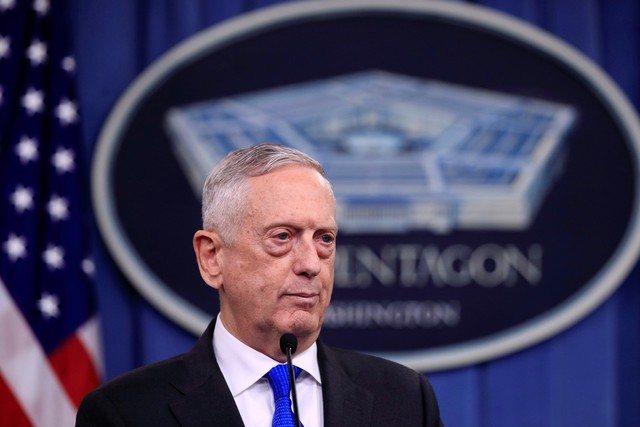 |
|
US Secretary of Defense James Mattis holds a press conference at the Pentagon on Aug. 28 (AP)
|
Policy officials seek to infer background behind US Defense Secretary’s remarks
After US Secretary of Defense James Mattis reportedly said that South Korea and the US have no plans to suspend any more of their joint military exercises, South Korea’s defense and foreign policy officials are keeping a close eye on the background and motivations of Mattis’s remarks.
“Secretary Mattis’s remarks appear to be in line with our previous agreement with the US in regard to suspending the joint military exercises, and no additional agreement has been reached,” South Korea’s Ministry of Foreign Affairs said on Aug. 29.
An official from the Defense Ministry offered typical government boilerplate: “There hasn’t been any discussion about our joint military exercises, and matters related to those exercises will be decided through bilateral deliberations.”
But inside the government, many officials reportedly think that Mattis’ comments are designed to pressure North Korea and support the US State Department’s diplomatic efforts to bring about the North’s denuclearization.
“Mattis said that none of the details had been decided, including whether the Freedom Guardian exercises would be carried out next year, and said that he would be deliberating this with the State Department. This appears to mean that the US will continue those deliberations while watching how the situation plays out,” said an official from the South Korean military.
But if North Korea and the US’s recent tug-of-war over denuclearization intensifies without the two sides finding common ground, this could lead to the actual resumption of the joint exercises, analysts say.
The joint drills and exercises that South Korea and the US suspended after the North Korea-US summit in June are the Ulchi Freedom-Guardian exercises and two rounds of the Korea Marine Exercise Program. The Ulchi Freedom-Guardian (UFG) exercises, which are carried out every August, are not field mobility exercises but rather command post exercises, which involve computer simulations. But as they’re war games that are predicated on an all-out war covering the entire Korean Peninsula, North Korea has always attacked them as a “rehearsal of an invasion of the North.”
If resumed, marine tactical drills likely to take place first
The Korea Marine Exercise Program (KMEP) comprises small-scale tactical drills between battalions and smaller units from the III Marine Expeditionary Force, which is stationed on the Japanese island of Okinawa, and the Republic of Korea Marine Corps in Pohang, North Gyeongsang Province.
If South Korea and the US take steps to resume their joint drills and exercises, the KMEP is likely to be resumed first. This past June, South Korean and American military officials stipulated that the KMEP exercises were being suspended “through September.”
“There are over 10 KMEP exercises scheduled between October of this year and February of next year. I understand that technical work is being done to ensure that these exercises can be held according to plan,” said a South Korean military official.
It would also be possible to move forward with Vigilant Ace, a joint air drill that is held between October and December each year, while the trilateral missile warning exercises between South Korea, the US and Japan, which have been suspended since December of last year, could be resumed at any time as well. On the other hand, there are no more war games covering the entire peninsula this year. The Key Resolve and Foal Eagle exercises have been carried out between February and April of every year.
Potential negative effects of joint drills on North Korea and South Korean military drills
If South Korea and the US resume joint military exercises and drills, North Korea is likely to protest in one form or another. If North Korea resumes military provocations, Seoul will come under pressure to not only resume joint military exercises with the US but also to augment the its own independent exercises that it has previously reduced or suspended. When the Freedom Guardian exercises, scheduled for August, were suspended, Seoul also decided not to hold the corresponding Ulchi exercises that the government has used to rehearse its contingency plans for emergency situations.
In addition, the independent Taegeuk exercises that are organized by the office of the Joint Chiefs of Staff were pushed back from June to October, and the decision was made to combine them with the Ulchi exercises starting next year. Gunnery exercises that have been held every year on Baekryeong Island and other islands in the Yellow Sea involving K9 Thunder self-propelled howitzers and KH178 towed field guns were not held in July or August of this year.
“The South Korean military conducts these exercises when it deems necessary, separately from its joint exercises with the US. But if North Korea carries out provocations, we probably couldn’t just sit there and watch,” said an official in the South Korean military.
By Park Byong-su, senior staff writer
Please direct comments or questions to [english@hani.co.kr]







